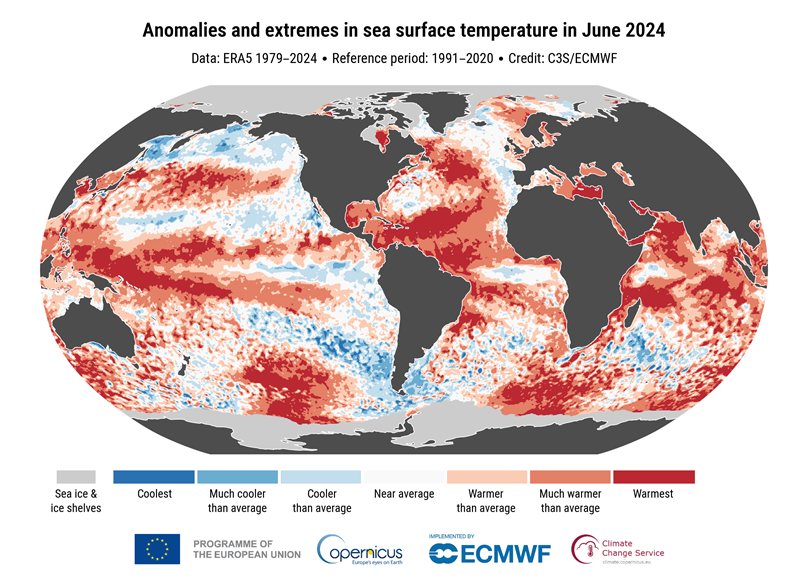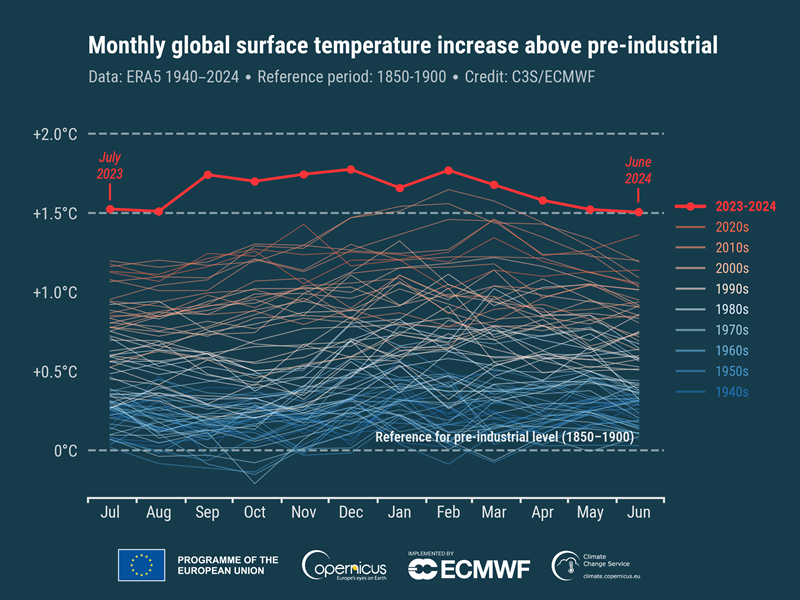
C3S: Unprecedented heat streak signals dire climate warnings for 2024
08/07/2024TN&MTThe European Union's Copernicus Climate Change Service (C3S) reported that June 2024 was the hottest June on record, continuing a 13-month streak of unprecedented global temperatures. Every month since June 2023 has ranked as the planet's hottest compared to the same months in previous years. Recent data suggests that 2024 may surpass 2023 as the hottest year on record, driven by human-caused climate change and the natural El Nino phenomenon.
A record-breaking streak of heat
The European Union's Copernicus Climate Change Service (C3S) declared June 2024 as the hottest June on record, extending a 13-month streak of unprecedented global temperatures. Each month since June 2023 has consecutively ranked as the hottest compared to respective months in previous years. Recent data suggests that 2024 could surpass 2023 as the hottest year on record, driven by both human-caused climate change and the natural El Nino phenomenon.
According to Reuters, Zeke Hausfather, a research scientist at Berkeley Earth, indicated to Reuters a 95% likelihood that 2024 will indeed become the warmest year since global surface temperature records began in the mid-1800s. This persistent heatwave has already resulted in severe consequences, including over 1,000 deaths during the haj pilgrimage, heat-related fatalities in New Delhi, and among tourists in Greece.

Carlo Buontempo, director of C3S, underscored that this continual rise in global temperatures signifies a significant and ongoing climate shift. He cautioned that unless greenhouse gas emissions are reduced, new temperature records will persistently be set. "Even if this specific streak of extremes ends at some point, we are bound to see new records being broken as the climate continues to warm," Buontempo emphasized. Nicolas Julien, a senior climate scientist at Copernicus, highlighted the criticality of the 1.5-degree Celsius mark, noting its alignment with the warming limit set by the 2015 Paris climate agreement. "It's a stark warning that we are approaching this crucial limit," Julien stated. "Global temperatures are escalating at a rapid pace.
Global temperature trends
The C3S report also noted that the global average temperature for the past 12 months (July 2023-June 2024) was the highest on record. This period saw temperatures 1.64 degrees Celsius above the pre-industrial average (1850-1900). June 2024, in particular, recorded an average surface air temperature of 16.66 degrees Celsius, making it the hottest June on record.

The Paris Agreement aims to limit global warming to well below 2 degrees Celsius, with efforts to cap it at 1.5 degrees Celsius. However, achieving this goal requires long-term reductions in global temperatures over 20-30 years. Julien emphasized, “Even without hitting the long-term 1.5-degree threshold, we have seen the consequences of climate change, these extreme climate events," referring to worsening floods, storms, droughts, and heatwaves.
June 2024 was the 15th consecutive month that the world's oceans have broken heat records. The primary driver of this long-term warming is greenhouse gas emissions from burning fossil fuels. The natural El Nino and La Nina cycles also influence global temperatures, with El Nino contributing to recent record highs. Regions such as Southeast Europe, Turkey, Eastern Canada, and parts of the United States and Brazil experienced intense heat in June, leading to numerous heat-related health issues. In Pakistan, doctors treated thousands of heatstroke victims as temperatures soared to 47 degrees Celsius.
Looking ahead
Despite the likelihood that the record-breaking streak may end, climate scientists warn that the underlying trend of global warming persists. Andrew Weaver from the University of Victoria, in an interview with AP, cautioned that without urgent emission reductions, the Earth is on track for 3 degrees Celsius of warming. He expressed concern that the end of the heat streak and the arrival of winter may cause people to forget the ongoing climate crisis.
According to AP, Andrea Dutton from the University of Wisconsin highlighted the broader implications of these temperature records, noting that each new record increases the likelihood of climate change-related crises impacting communities worldwide. Copernicus, utilizing extensive satellite, ship, aircraft, and weather station data, continues to monitor and analyze these trends, providing crucial insights into our changing climate.
Ngoc Huyen (The European Union's Copernicus Climate Change Service - C3S)
















